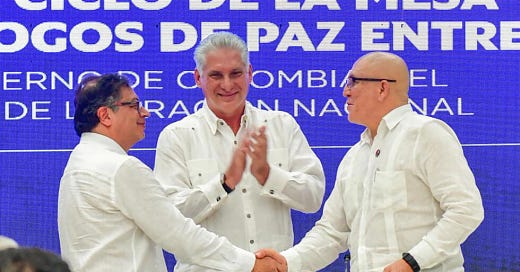
Colombia’s largest guerrilla force, the ELN, ordered units across the country to stop attacks on the nation’s military as it prepares for a ceasefire with the government slated to start in August.
Colombia's defense minister confirmed the armed forces would also be told to halt offensives starting tomorrow.
The ELN said its fighters will continue to use their weapons to defend themselves from any attack staged by the military or other armed groups that operate in Colombia’s rural areas.
The ceasefire is supposed to last six months, and is meant to facilitate peace talks that began at the end of last year, and are expected to last at least until 2025. If it holds, it would be the longest halt in the conflict the ELN has agreed to since first taking up arms against the Colombian state in 1964.
(Associated Press, BBC, AFP, Reuters)
Guatemalan ruling party calls for full manual recount
A group of four Guatemalan political parties — including the governing Vamos — are pushing for a full recount of the June 25 election ballots, as electoral authorities advance with a reexamination of tally sheets ordered by the Constitutional Court, reports Prensa Libre. Other parties rejected the request, saying opening sealed ballot boxes for a manual recount was not specified in the court ruling or in Guatemalan law, reports EFE.
The decision this weekend to review results (see Monday’s post) was criticized by the European Union and the OAS, both of which had observer missions at the June 25 vote and detected no significant irregularities. The OAS announced Monday that it would send its electoral observation mission back to Guatemala for the revision of results. (AFP)
The court’s was strongly criticized by former judges and prosecutors who have battled corruption in Guatemala. “The Constitutional Court violated the electoral procedure by ordering a new hearing to review the counting of votes. This procedure is outside of what is established in the Electoral and Political Parties Law, whose precepts are imperative,” criticized Claudia Paz y Paz, a former attorney general who led the investigations into the genocide committed in the country during the civil war. (El País)
The suspension of election results in Guatemala is “another sign that elite corruption networks are leveraging their control of the court system to salvage an election in which they were resoundingly rejected by the electorate,” according to InSight Crime. “If they succeed, it could deal a fatal blow to Guatemalan democracy.”
Brazil
Brazilian President Luiz Inácio Lula da Silva said he wants the Mercosur trade bloc to advance in talks for deals with Canada, South Korea and Singapore, while aiming to increase commerce with other countries in Latin America and Asia. (Reuters, see yesterday’s post.)
The Brazilian Senate approved Lula's first picks for the independent central bank, yesterday. Former finance ministry official Gabriel Galipolo's nomination for director of monetary policy was approved by a vote of 39 to 12 in the Senate's plenary. (Reuters)
Trinidad and Tobago
The Trinidad and Tobago High Court ruled that 1951 Refugee Convention obligations do not apply and cannot be enforced in the twin-island republic.
This means that all migrant, refugees and asylum seekers can be deported — even if they have registered with United Nations High Commissioner of Refugees. (CMC)
Regional
The Caribbean is the most exposed region to climate-related natural disasters, with estimated adaptation investment needs of more than $100 billion, equal to about one-third of its annual economic output. At the same time, energy prices in the Caribbean are among the highest in the world, and electricity is largely generated using fossil fuels, highlighting the need for investment in lower-cost and lower-carbon energy production, according to a new IMF blog post.
Argentina
There are several separate allegations that Argentina’s libertarian, outsider candidate Javier Milei is selling slots on his Libertad Avanza party ballot ahead of general elections in October. (Página 12)
Milei and the main economic advisor for center-right presidential candidate Horacio Rodríguez Larreta both said that currency controls implemented by the current government could not be lifted suddenly without causing chaos. (Buenos Aires Times, via The Road to the Casa Rosada)
The latest polls show a decline in Milei’s popularity, with the ruling coalition candidate Serio Massa just behind the combined votes of the main conservative opposition bloc's top two candidates, ex-Security Minister Patricia Bullrich and Buenos Aires Mayor Horacio Larreta. (Reuters)
Argentina's first plant for lithium batteries will begin operations in September, using metal extracted locally by U.S. company Livent Corp, according to mining officials. (Reuters)
Peru
Peru’s government is set to declare a state of emergency for the area surrounding the Ubinas volcano, in response to persistent seismic activity that sent a column of toxic gas into the air. (Al Jazeera)




